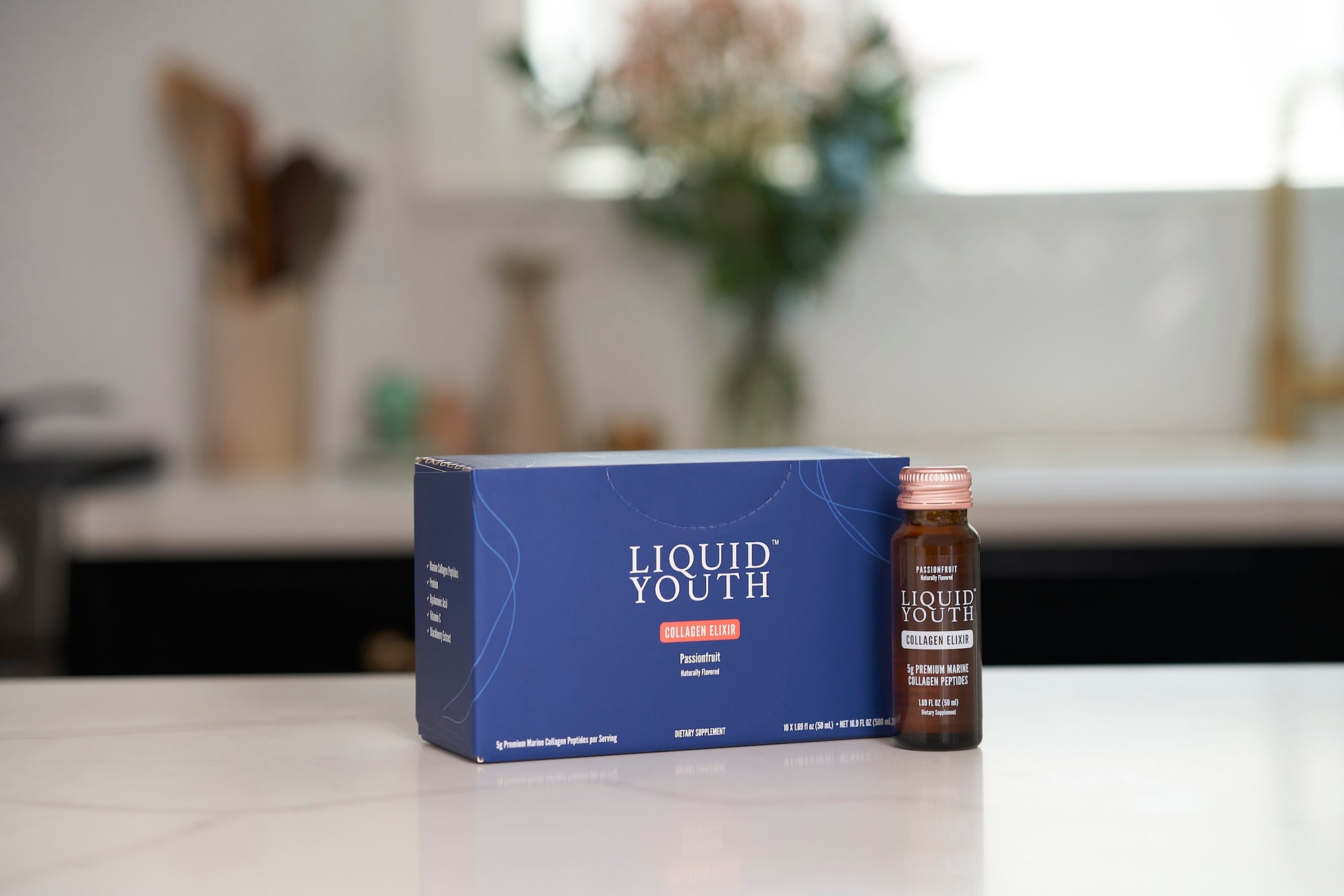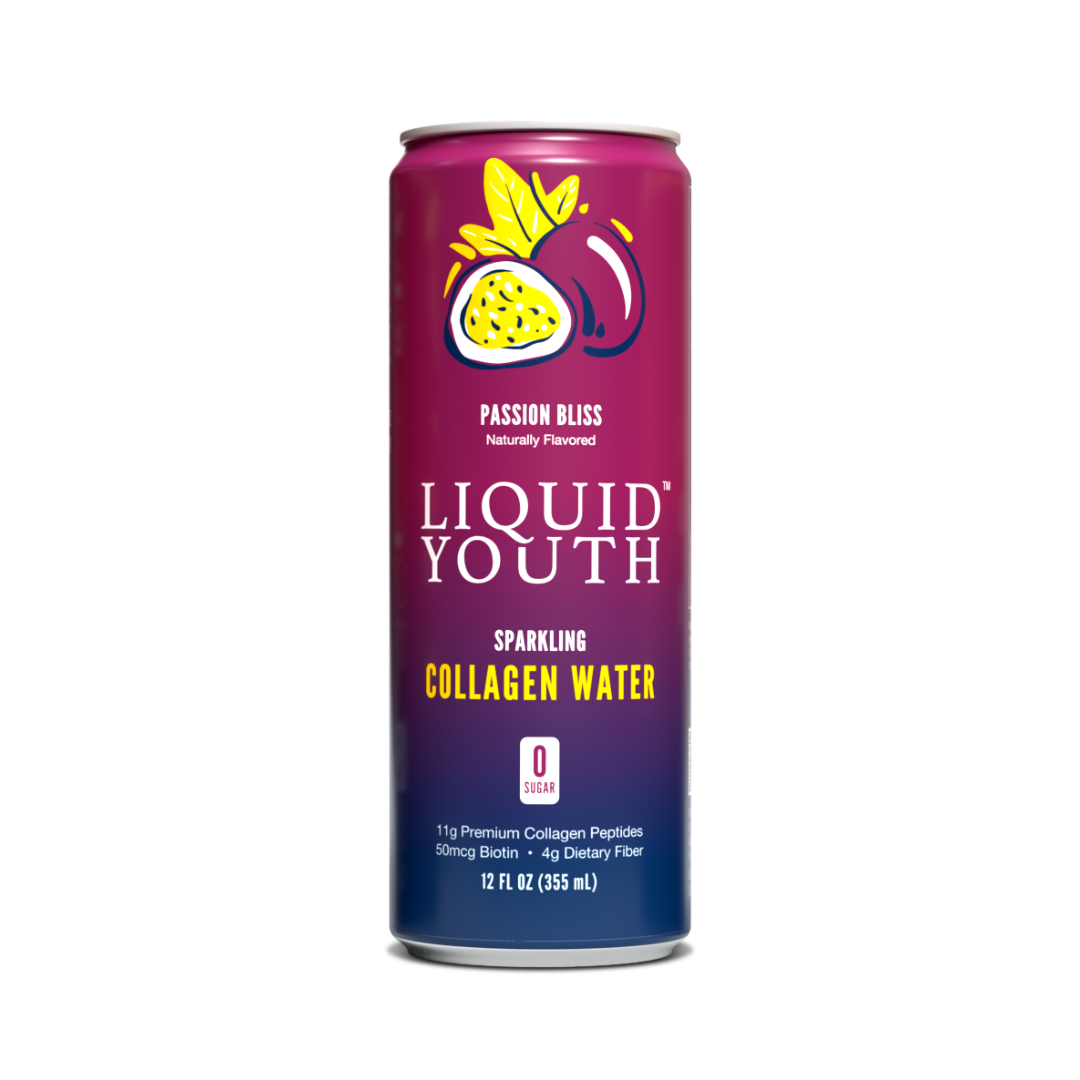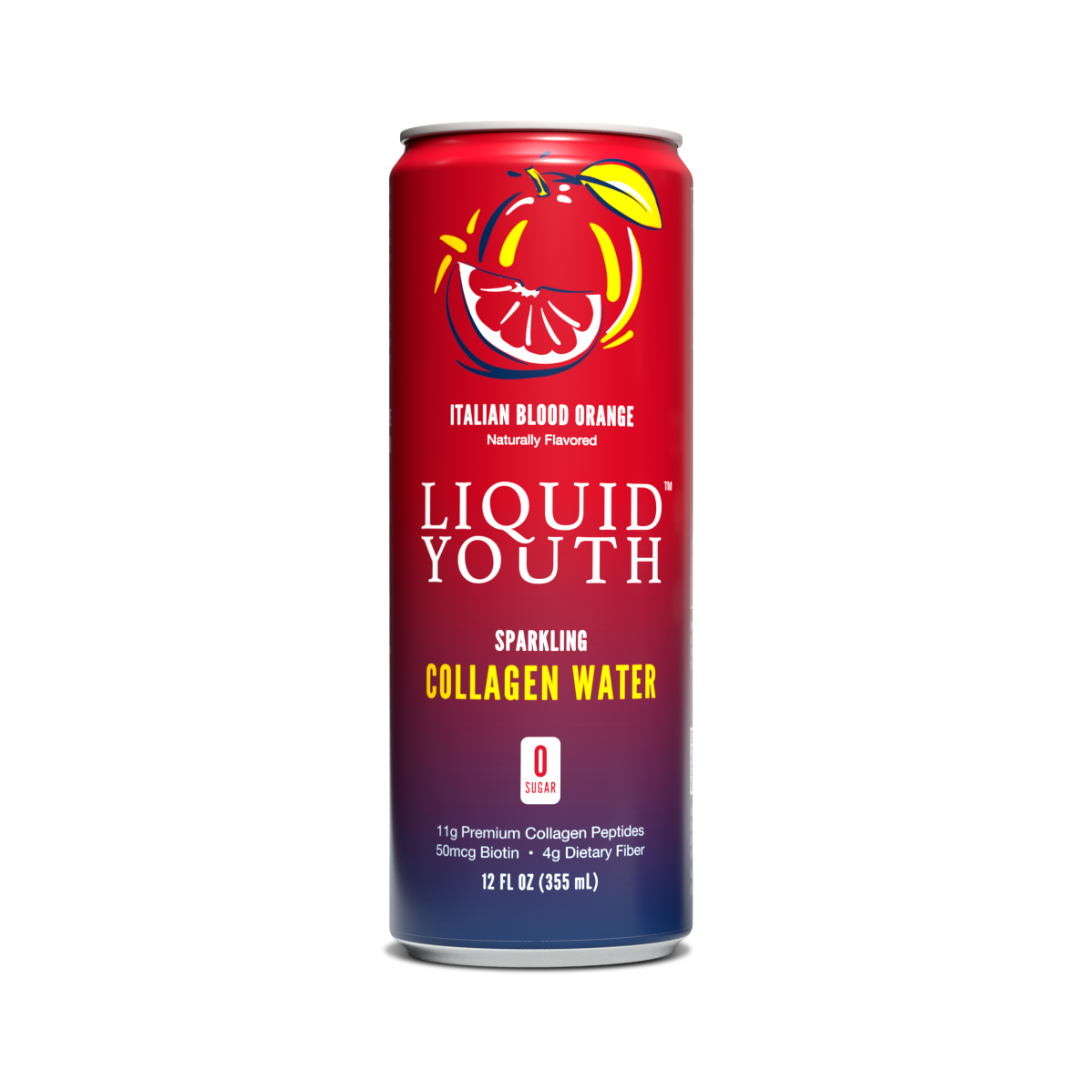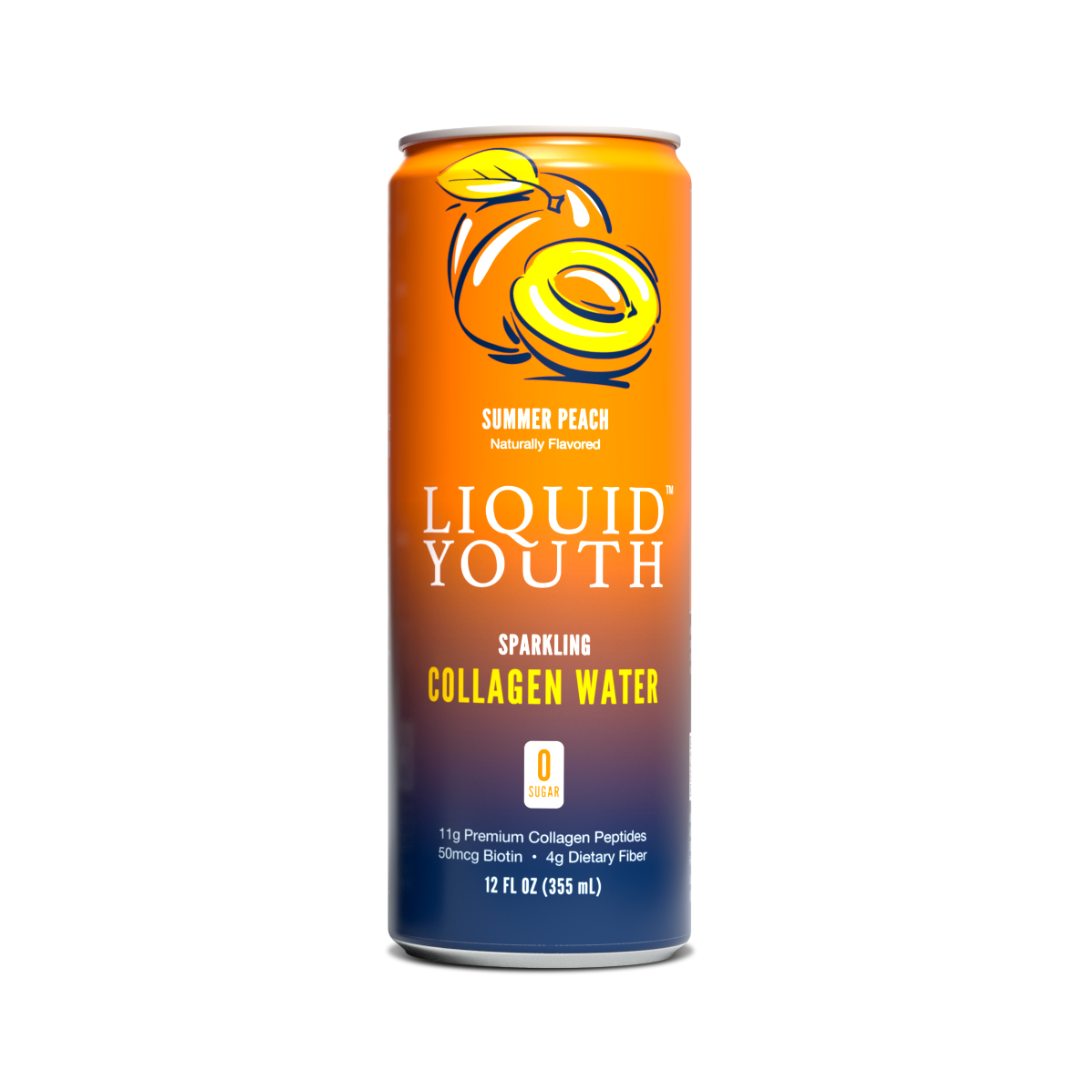Liquid Collagen vs. Other Forms: A Comprehensive Comparison Guide

Collagen Drink vs Collagen Powder Summary
- Collagen drinks are usually sourced from either marine or bovine collagen peptides.
- Marine collagen peptides comprise primarily type I collagen, whereas bovine collagen peptides contain type I and III collagen.
- Some studies have found that marine collagen peptides have better bioavailability than bovine collagen peptides.
- Collagen drinks offer convenience and require no mixing of powders, which is beneficial for those on the go.
Whether liquid or powder, collagen peptides and supplements are all the rage lately--and for good reason! Collagen is the most abundant protein in the human body, forming a vital part of skin, bones, muscles, and connective tissues. Its primary function is to maintain the structural strength and flexibility of these tissues. As we age, the body's collagen production declines, resulting in visible signs of aging and decreased flexibility in joints. The decline in the body's ability to produce collagen typically begins around 30 and continues to decrease by one percent annually. By 60, your collagen levels are halved, reaching their lowest level (Varani et al., 2006). This has sparked a surge of curiosity in collagen supplements as potential solutions. Collagen peptides offer promising benefits, including enhanced hydration, wrinkle reduction, and overall improvement in skin, hair, and nail health.
Sources of Collagen Peptides
Before collagen supplements became widely available, people typically acquired collagen from natural dietary sources. Bone broth and gelatin, sourced from animal tissues, were popular choices for harnessing collagen's benefits. However, relying solely on these traditional sources isn't the most effective method for boosting your body's collagen production. Collagen peptides are a more easily absorbed form that can stimulate collagen production effectively.
Liquid Collagen
Liquid collagen, such as collagen drinks and collagen shots, is becoming increasingly popular among the various forms of collagen supplements. Studies have found that collagen peptides taken with foods and liquids such as yogurt result in superior absorption and convenience compared to traditional powder (Iwasaki et al., 2020). Collagen drinks, typically formulated with additional ingredients like hyaluronic acid and vitamin C, are frequently made as convenient, ready-to-consume beverages. They cater to individuals looking for seamless integration of collagen peptides into their busy lifestyles, without the hassle of powders and mixing ingredients. This guide will thoroughly compare liquid collagen with powder collagen, assessing nutritional content and cost-effectiveness to help you make an informed choice based on your lifestyle needs and supported by scientific evidence.

Understanding Collagen Types
The human body contains several types of collagen, with at least 28 different types identified. Types I, II, and III are the most common:
Type I collagen is the most abundant, found in skin, tendon, vasculature, organs, and bone. It's crucial for wound healing and providing skin elasticity (Bou-Gharios, 2020).
Benefits: Type I collagen enhances skin health by improving elasticity and hydration, helping reduce fine lines and wrinkles. It also contributes to bone density and strength. Additionally, it provides essential strength and elasticity to tendons and ligaments, supporting their flexibility and resilience, which is crucial for overall joint and muscle function.
Type II collagen is mainly found in cartilage and intervertebral discs, critical in joint health and resilience (Ricard-Blum, 2011).
Benefits: Type II collagen is essential for joint health as it is the main cartilage component that cushions the joints. It helps maintain and repair cartilage. Supplementing with type II collagen can support those suffering from joint pain and stiffness, enhancing overall joint function and mobility.
Type III collagen, commonly found alongside type I, supports the structure of muscles, organs, and arteries (Steele, 2022).
Benefits: Type III collagen supports the structure and function of muscles, organs, and arteries. It maintains cardiovascular health by ensuring the integrity and flexibility of arterial walls.
Collagen Peptides: Marine vs Bovine Sources
Bovine collagen is sourced from cows; it is primarily type I and III collagen. Bovine collagen is widely used due to its availability and similarity to human collagen. Marine collagen is extracted from fish skin and scales, It's rich in type I collagen and is known for its superior absorption and sustainability.
Absorption Differences Between Marine and Bovine Collagen Drinks
The efficacy of collagen supplements, whether marine or bovine, largely depends on their bioavailability, which is significantly influenced by their absorption properties. Understanding these differences is crucial for consumers to decide which collagen type may be more beneficial.
Marine Collagen Drinks
Marine collagen, primarily sourced from fish skin and scales, is notable for its superior absorption properties. With smaller peptides compared to collagen from mammalian sources, it enables a faster and more effective digestion and absorption process. Studies have highlighted marine collagen's ability to be absorbed more readily into the bloodstream, resulting in increased bioavailability (Jafari et al., 2020). These characteristics make marine collagen especially beneficial for those looking to enhance skin health, bone density, and metabolic stability.
Bovine Collagen Drinks
Derived from cows, bovine collagen primarily consists of type I and III collagen, similar to the collagen present in human skin and bones. Although bovine collagen promotes skin health and joint function effectively, its larger peptide size typically results in a slower digestion and absorption rate compared to marine collagen. Nonetheless, bovine collagen remains highly beneficial, supplying essential amino acids that support the body's collagen synthesis. Randomized controlled trials have revealed unique advantages associated with both marine and bovine collagens, each addressing different needs. Ultimately, the decision often hinges on individual health objectives, dietary preferences, and specific bodily demands.
Collagen Powder vs Collagen Drinks
Collagen powder peptides are a popular dietary supplement made by extracting collagen from animal tissues and breaking down the proteins into smaller peptides through hydrolysis. This method increases the collagen's bioavailability, enhancing its absorption by the body. Powdered collagen peptides readily dissolve and can be added to various foods, beverages, or smoothies, making it a versatile option for daily intake.
What's the Best Collagen Drink for You?
From a practical standpoint, powder collagen peptides are often unflavored and can be incorporated into various recipes without significantly altering the taste or texture. In contrast, liquid collagen is usually pre-flavored and can be consumed directly, which might be preferable if you're looking for something convenient and easy to use. There's one caveat, however: it can be limiting if you're sensitive to taste or dietary additives. Ultimately, the choice between powder and liquid collagen often comes down to personal taste preferences and how easily they can be incorporated into your daily regimen.
Featured Products
Resources
1. Bou-Gharios, G. (2020). Type I collagen structure, synthesis, and regulation.Principles of Bone Biology.
2. Iwasaki, Y., Taga, Y., Suzuki, A., Kurokawa, M., Sato, Y., & Shigemura, Y. (2020). Effect of Co-Ingestion of Collagen Peptides with Yogurt on Blood Absorption of Short Chain Hydroxyproline Peptides. Applied Sciences.
3. Jafari, H., Lista, A., Siekapen, M. M., Ghaffari-Bohlouli, P., Nie, L., Alimoradi, H., & Shavandi, A. (2020). Fish Collagen: Extraction, Characterization, and Applications for Biomaterials Engineering. Polymers,12.
4. Ricard-Blum, S. (2011). The collagen family. Cold Spring Harb Perspect Biol,3(1), a004978.
5. Steele, C. (2022).Collagen: A Review of Clinical Use and Efficacy. Nutr Med J., 1 (2): 12-36.
6. Varani, J., Dame, M. K., Rittie, L., Fligiel, S. E., Kang, S., Fisher, G. J., & Voorhees, J. J. (2006).
7. Decreased collagen production in chronologically aged skin: roles of age-dependent alteration in fibroblast function and defective mechanical stimulation. Am J Pathol,168(6), 1861-1868.This statement has not been evaluated by the Food and Drug Administration. This product is not intended to diagnose, treat, cure, or prevent any disease.


















